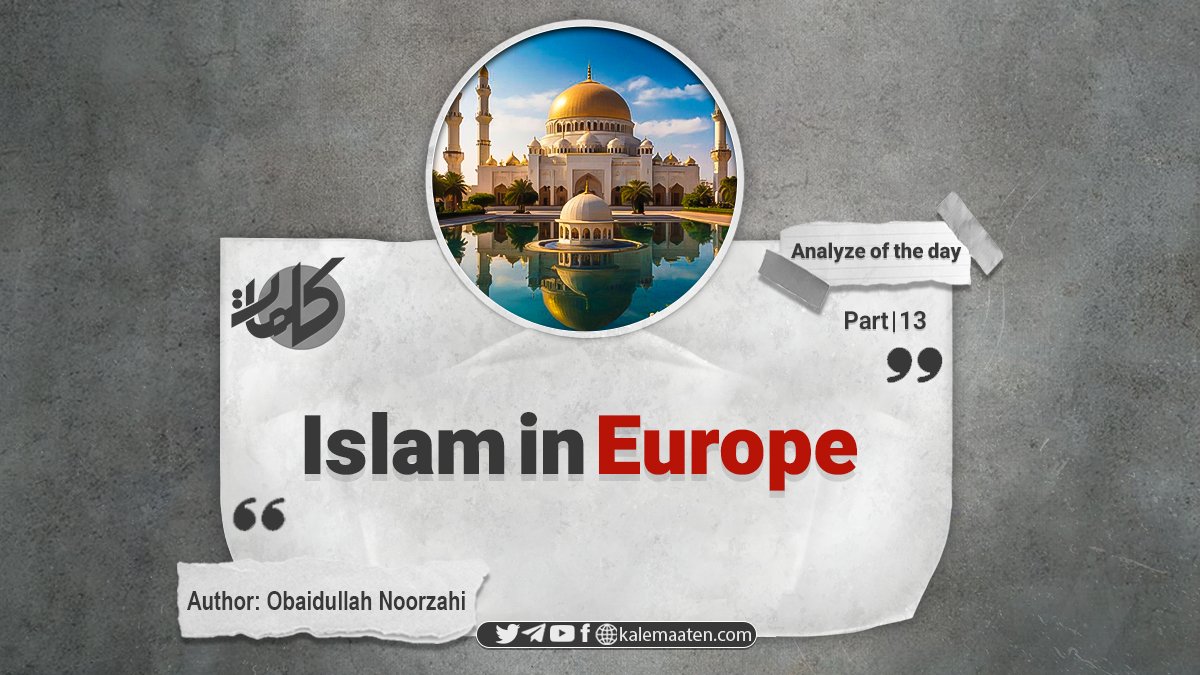
Author: Obaidullah Noorzahi
Islam in Europe (Part 13)
Western and Central Europe
At a time when Western Europe was engulfed in the fires of medieval ignorance and superstition, and when any thought and creativity were condemned and suppressed by the Church, the Islamic world was at the peak of its scientific and cultural prosperity. During this period, the universities of Seville, Toledo, and Cordoba were known as significant scientific and cultural centers, attracting many young people from all over Europe seeking education.
Although Islam contributed not only to scientific advances but also to strengthening morality and human relations, after the Europeans emerged from medieval ignorance and achieved development, they began to see Islam as an obstacle to their ambitions. Consequently, they took several measures to weaken Muslims, including the division of Andalusia, the suppression of Muslims in those regions, and military actions against the Ottoman state.
In later periods, European colonialists occupied Islamic lands under the pretext of accessing natural resources and new markets. They attempted to replace Islamic traditions with their own materialistic and consumerist values by distorting Islamic culture and identity.
According to Roger de Pasquier: “The colonial rule of European powers in many Muslim countries was accompanied by unprecedented violence. Unlike the Crusades or the Mongol invasions, this invasion penetrated the depths of Islamic culture and identity not only physically but also by using the deceptive ideas of modern civilization. If in the past the enemies of Islam enslaved bodies, today lives and thoughts are the main targets of attacks.”
After the end of the era of direct colonialism in Islamic countries, the West did not abandon its hostility toward Islam. This hostility took on another form, continuing through cultural invasion, which created tension in Muslim-populated areas and established indirect political control over Islamic countries. The main goal of these measures was to separate Muslims from their Islamic values and promote a culture of the separation of religion and politics so that the West could plunder their resources and reserves without a direct presence in Islamic lands.
The West sought to weaken Islamic culture and civilization by promoting ethnocentrism and racism, fomenting division, supporting puppet states, and forming alliances with Jews. Other methods included removing Islam from political and cultural equations, changing the Islamic names of geographical areas, downplaying Muslims in official statistics, altering Islamic traditions such as the hijab, and undermining Islamic values with labels such as “reactionary” and “old-fashioned.”
They also attempted to weaken Quranic culture by attacking the language of the Quran and replacing it with other languages. These measures, rooted in the West’s deep-seated animosity toward Islam, were taken in line with a long-term goal of removing Islam from global equations.
Despite these efforts, the West has failed to achieve its goals. Islam is still alive and spreading, and its truth becomes clearer to the world every day. In the words of Roger de Pasquier: “Islam, the bearer of the last divine revelation, continues to spread its light in this dark age. This eternal religion, as a divine mercy, will remain available to humanity until the end of the world.”
United Germany
Following fundamental developments in the Eastern Bloc, on October 3, 1990, the eastern and western parts of Germany reunited after 45 years of separation to form a single country. Germany now has an area of 357,000 square kilometers and a population of over 78 million, 82% of whom live in urban areas.
The first presence of Muslims in Germany dates back to the 18th century, coinciding with the exchange of political delegations between Prussia and the Ottoman Empire. During World War I (1914-1918), the Ottoman Empire entered the war on Germany’s behalf. Although this alliance was ultimately defeated, it contributed to the spread of Islam in Germany.
After the division of Germany into eastern and western parts, a significant number of Muslims from socialist countries sought refuge in West Germany. Additionally, the large-scale immigration of Turkish Muslims to Germany, especially beginning in 1955, played an important role in increasing the Muslim population. Turkish workers in Germany took on low-level jobs, with 95 percent of the dustmen in Frankfurt being Turks.
The Turkish government, due to its need for foreign currency earned through Turkish labor in Germany, did not react particularly to the humiliation and insults inflicted on its Muslim citizens. After Germany achieved its economic and cultural goals, it prevented further Turkish immigration in 1979 and encouraged those already there to return.
Turks, who make up about 1.5 million of the German population, represent the majority of the country’s Muslims. Additionally, about 400,000 Arabs and 100,000 Muslims from the former Yugoslavia reside in Germany, along with Muslims of various other nationalities. The largest concentrations of Muslims are found in regions such as Bavaria, Rhineland, Westphalia, and Baden-Württemberg.
Today, the number of Muslims in Germany is estimated to be more than 2.5 million. However, Muslims face many challenges, including a lack of recognition by the government. For example, in 1988, German authorities closed the Cologne Islamic School, which was run by Sheikh Kamaluddin Qabalan. The Bonn city court also ordered the eviction of the only Muslim prayer house, which had been rented since 1979. These actions reflect the pressures that continue to be exerted on Muslims in Germany.
Continues…


